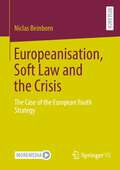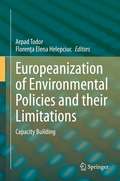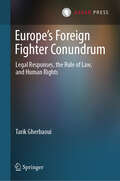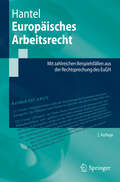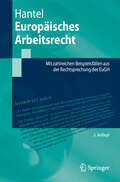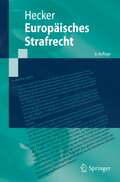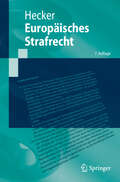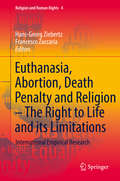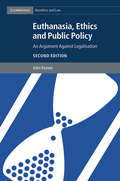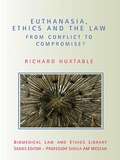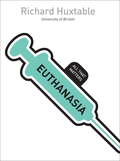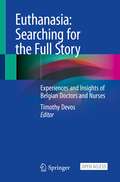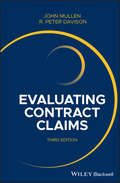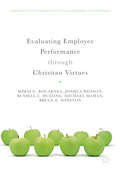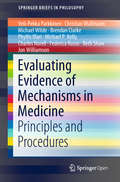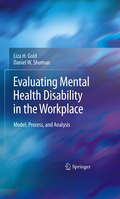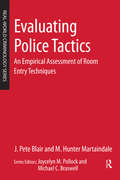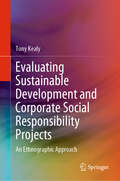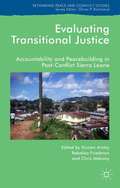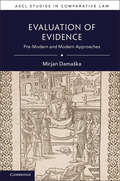- Table View
- List View
Europeanisation, Soft Law and the Crisis: The Case of the European Youth Strategy
by Niclas BeinbornInfluence of “hard” law on national policies still is a central topic in Europeanisation research. One aspect often overlooked is the impact of “soft” law instruments such as the “Open Method of Coordination” (OMC). Through the OMC all member states agree on common goals and exchange “best practices” to improve policy coordination in a certain area without the obligation (how) to design policies. OMC impacts in individual member states have been studied extensively, yet a comparative perspective explaining their variance is lacking. This study by Niclas Beinborn tries to fill this gap by analysing the different impacts of a recent OMC: the European Youth Strategy 2010 (EUYS). His analysis is twofold: in a first step he applies theory-driven fuzzy-set QCA to a novel dataset depicting the variance of national activities around the EUYS. As causalities remain unclear, in a second step he presents an innovative analysis framework encompassing two dimensions – national motivation and relative openness to implement non-binding EU law – to define ideal types of OMC adaptation. Case studies on the EUYS in Germany and Ireland proof the potential of this framework to explain why and how OMCs work (differently).
Europeanization of Environmental Policies and their Limitations: Capacity Building
by Arpad Todor Florenţa Elena HelepciucThis book offers a window into the mechanisms that drive events when countries with poor track records in environmental protection and low administrative capacity, join an organisation with ambitious environmental regulatory regimes, which include some of the highest environmental protections standards in the world.This book examines the institutional building capacity in Romania after two decades of the development of the EU's environmental policy on elaboration, transposition, implementation, monitoring and institutional building. The book examines how Romania has fared as one of the least environmentally friendly EU member states, and poses the following questions. What are the limits of Europeanisation in the area of public policies? What is the reason why, despite the overwhelming public interest in environmental issues, and widespread agreement that urgent action to protect the environment and prevent catastrophic climate change are paramount, the pace of achieving the goals is remains slow. Why do policies fail?This book brings together several case studies focusing on the evolution of environmental policies in Romania over the last twenty years, with a special focus on the post-accession period (2007 onwards). The book provides an analysis of policies, where progress is less than satisfactory, and examines why this is the case.
Europe’s Foreign Fighter Conundrum: Legal Responses, the Rule of Law, and Human Rights
by Tarik GherbaouiThis book explores how Europe can resolve its foreign fighter conundrum without losing its credibility as a guardian of the rule of law and human rights. Centring on European foreign fighters who travelled to the armed conflict in Syria and Iraq, this book examines to which extent legal responses to the security threat posed by foreign fighters have been consistent with the rule of law and human rights. The transnational nature of the foreign fighter phenomenon has created a messy labyrinth of legal obligations at the international, European, and domestic levels. To dissect this multi-layered counter-terrorism architecture, the book analyses the intricate interplay between legal norms at these different levels, with a special focus on prosecution and citizenship deprivation. Pertinent issues discussed in this book include multilateral responses by the United Nations, the European Union, and the Council of Europe, as well as the interplay between the ‘foreign terrorist fighter’ concept and definitions of terrorism. The book also addresses the conflation between counter-terrorism law and international humanitarian law, and the increasing preventive shift within counter-terrorism law. Drawing on insights from various fields of law, the book's comprehensive and thorough assessment of the rule of law and human rights implications of permanent international, regional, and domestic legal measures to foreign fighters offers best practices for managing future terrorist threats and challenges. It is an essential resource for both researchers and practitioners in the field of counter-terrorism, national and international security, and international law. Tarik Gherbaoui is a Researcher in international law in the Research Department of the T.M.C. Asser Instituut in The Hague, the Netherlands.
Europäisches Arbeitsrecht: Mit zahlreichen Beispielsfällen aus der Rechtsprechung des EuGH (Springer-Lehrbuch)
by Peter HantelDas Lehrbuch behandelt die für das deutsche Arbeitsrecht bedeutsamen EU-rechtlichen Problembereiche wie den allgemeinen EU-Arbeitnehmerschutz, Diskriminierungsverbote in Gehalts- und sonstigen Angelegenheiten, Insolvenzsicherung, Betriebsübergang, Massenentlassung, Arbeitszeit und Urlaubsfragen sowie prekäre Arbeitsverhältnisse. Ergänzend werden kollektivrechtliche und kollisionsrechtliche Fragestellungen dargestellt. Alle Problembereiche werden im Zusammenhang mit den für das deutsche Arbeitsrecht besonders relevanten EuGH-Entscheidungen erläutert. Dabei werden Sachverhalt und EuGH-Leitsätze komprimiert und gut lesbar wiedergegeben. Studenten der Rechts- und Wirtschaftswissenschaften aber auch Rechtsanwälten und Praktikern im HR Bereich wird damit ein Überblick über Grundfragen und Probleme des Europäischen Arbeitsrechts im Zusammenhang mit der Darstellung von insgesamt 98 für die betriebliche Praxis besonders wichtigen EuGH-Entscheidungen vermittelt.Neben neuen EuGH-Entscheidungen (etwa zur Massenentlassungs-Richtlinie RL 98/59/EG, Insolvenzschutz-Richtlinie RL 2008/94/EG sowie zu den Antidiskriminierungs-Richtlinien RL 2000/43/EG, RL 2000/78/EG und RL 2006/54/EG) berücksichtigt die vorliegende zweite Auflage u.a. die Änderung der Entsende-Richtlinie sowie die Auswirkungen der Datenschutzgrundverordnung (DSGVO) auf Arbeitnehmer.
Europäisches Arbeitsrecht: Mit zahlreichen Beispielsfällen aus der Rechtsprechung des EuGH (Springer-Lehrbuch)
by Peter HantelDas Lehrbuch behandelt die für das deutsche Arbeitsrecht bedeutsamen Entscheidungen des EuGH. Der Schwerpunkt liegt auf den Themen Arbeitnehmerfreizügigkeit, Diskriminierungsverbote in Geschlechts- Gehalts- und sonstigen Angelegenheiten, Insolvenzsicherung, Betriebsübergang, Massenentlassung, Arbeitszeit und Urlaubsfragen sowie prekäre Arbeitsverhältnisse und dem Beschäftigten-Datenschutz. Ergänzend werden kollektivrechtliche und kollisionsrechtliche Fragestellungen behandelt. Alle Problembereiche werden im Zusammenhang mit einschlägigen EuGH-Entscheidungen erläutert. Dabei werden Sachverhalt und EuGH-Leitsätze komprimiert und gut lesbar wiedergegeben. Studierende der Rechts- und Wirtschaftswissenschaften aber auch Rechtsanwält*innen und Praktiker*innen im HR Bereich wird damit ein Überblick über Grundfragen und Probleme des Europäischen Arbeitsrechts im Zusammenhang mit der Darstellung von insgesamt 90 für die betriebliche Praxis besonders wichtigen EuGH-Entscheidungen vermittelt. Neben neuen EuGH-Entscheidungen zur Teilzeitarbeits- (RL 97/81/EG) und zur Befristungs-(1999/70/EG) sowie zur Entsende-Richtlinie (96/71/EG) berücksichtigt die vorliegende 3. Auflage auch die neuere Rechtsprechung zur Arbeitszeit und deren Kontrolle durch Unternehmen sowie erste Entscheidungen zum Beschäftigten-Datenschutz und damit zusammenhängenden Schadensersatzansprüchen.
Europäisches Immaterialgüterrecht: Funktionen und Perspektiven (MPI Studies on Intellectual Property and Competition Law #26)
by Reto M. Hilty Thomas JaegerDas Buch folgt der Ausgangsvermutung, dass die EU nach wie vor keine kohärente Immaterialgüterrechtspolitik verfolgt, sondern über punktuelle, meist anlassbezogene Maßnahmen agiert. Die Schutzrechte erfüllen die ihnen zugedachten Funktionen damit oft nicht. Vor allem entfalten sie nicht ihr volles Potenzial für den Binnenmarkt.Untersucht wird, inwieweit die Regelungen der einzelnen Schutzrechte in sich selbst, im Verhältnis zu einander sowie zum sie umgebenden Wettbewerbsrecht, aber auch zum nationalen Recht funktionsadäquat sind.Dieser breit angelegte Gesamtblick auf den Acquis Communautaire erlaubt es aufzuzeigen, wo Handlungsbedarf besteht, wie alternative Regelungen aussehen könnten und welche Mechanismen dafür zur Verfügung stehen.
Europäisches Steuerverfassungsrecht: Symposion aus Anlass der Verabschiedung von Professor Dr. h.c. Rudolf Mellinghoff als Präsident des Bundesfinanzhofs (MPI Studies in Tax Law and Public Finance #11)
by Wolfgang Schön Johanna HeyDieser Band enthält Beiträge führender Steuer-, Verfassungs- und Europarechtswissenschaftler zu aktuellen Fragen des Europäischen Steuerverfassungsrechts. Die Aufsätze beruhen auf Vorträgen, die am 20. Mai 2022 anlässlich eines Festsymposions zur Verabschiedung von Professor Dr. h.c. Rudolf Mellinghoff als Präsident des Bundesfinanzhofs vorgestellt wurden. Das Themenspektrum reicht dabei von den Kompetenzen des Europäischen Steuergesetzgebers und dem Grundrechtsschutz im Bereich des europäischen Steuerrechts bis hin zu Vorschlägen für eine stärkere demokratische Rückanbindung im Fall der Einführung europäischer Steuern sowie zu Ausführungen zum Verhältnis von Persönlichkeitsrechten und öffentlichem Informationsinteresse bei der Offenlegung von Steuerdaten. Die Beiträge nehmen neben dem geltenden Recht stets auch die Zukunft und die Entwicklungsmöglichkeiten des Europäischen Steuerverfassungsrechts in den Blick.
Europäisches Strafrecht (Springer-Lehrbuch)
by Bernd HeckerDie vorliegende Neuauflage vermittelt das aktuelle Themenspektrum des Europäischen Strafrechts. Der komplexe und in zahlreichen Rechtsquellen supranationaler, völkerrechtlicher und nationaler Provenienz enthaltene Rechtsstoff wird in Form eines Kanons „abfragbaren Wissens“ systematisch aufbereitet. Die Rolle der Akteure des Europäischen Strafrechts wird ebenso beleuchtet wie die rechtlichen Mechanismen, die eine Europäisierung der mitgliedstaatlichen Strafrechtsordnungen bewirken. Breiten Raum widmet das Lehrbuch der EU-Gesetzgebung, die inzwischen zu einer weitreichenden Angleichung des Straf- und Strafverfahrensrechts der EU-Mitgliedstaaten geführt hat. Weitere Schwerpunkte der Darstellung bilden die von Europol und Eurojust unterstützte polizeiliche und justizielle Zusammenarbeit der Mitgliedstaaten sowie die Rolle der Europäischen Staatsanwaltschaft, die als supranationale Strafverfolgungsinstitution Straftaten gegen den EU-Haushalt verfolgt. Als zentrales Thema ist schließlich der Schutz der Grund- und Menschenrechte im justiziellen Mehrebenensystem (EuGH – EGMR – BVerfG) hervorzuheben, der im europäisierten Strafverfahren von herausragender Bedeutung ist. Zahlreiche Fallbeispiele erhöhen die Anschaulichkeit der Darstellung und erleichtern das Einprägen des ebenso praxis- wie klausurrelevanten Rechtsstoffes.
Europäisches Strafrecht (Springer-Lehrbuch)
by Bernd HeckerDie vorliegende Neuauflage liefert einen umfassenden Einblick in das aktuelle Themenspektrum des Europäischen Strafrechts. Der komplexe Rechtsstoff wird in Form eines Kanons „abfragbaren Wissens“ systematisch aufbereitet. Die Rolle der Akteure des Europäischen Strafrechts wird ebenso beleuchtet wie die rechtlichen Mechanismen, die eine Europäisierung der mitgliedstaatlichen Strafrechtsordnungen bewirken. Breiten Raum widmet das Lehrbuch der EU-Gesetzgebung, die zu einer weitreichenden Harmonisierung des Straf- und Strafverfahrensrechts der EU-Mitgliedstaaten geführt hat. Weitere Schwerpunkte der Darstellung bilden die von Europol und Eurojust unterstützte polizeiliche und justizielle Zusammenarbeit sowie die Rolle der Europäischen Staatsanwaltschaft, die als supranationale Strafverfolgungsinstitution Straftaten gegen den EU-Haushalt verfolgt. Ein eigenes Kapitel befasst sich mit der Ausformung des höchst praxisrelevanten transnationalen Doppelbestrafungsverbots. Als zentrales Thema ist schließlich der Schutz der Grund- und Menschenrechte im justiziellen Mehrebenensystem (EuGH – EGMR – BVerfG) hervorzuheben, der im europäisierten Strafverfahren von herausragender Bedeutung ist. Zahlreiche Fallbeispiele erhöhen die Anschaulichkeit der Darstellung und erleichtern das Studium der klausurrelevanten Rechtsmaterie.
Europäisches Zivilverfahrensrecht (Springer-Lehrbuch)
by Jens AdolphsenDas Lehrbuch stellt klar und verständlich die internationale Zuständigkeit deutscher und ausländischer Gerichte, die weltweite Anerkennung von nationalen Gerichtsentscheidungen sowie deren Vollstreckung im Ausland dar. Fallbeispiele und Wiederholungsfragen veranschaulichen die Materie und regen zum Mitdenken an. Die Internationalisierung und Globalisierung der Wirtschafts- und Rechtsbeziehungen hat in den letzten Jahrzehnten zu einem enormen Anstieg von Prozessen mit Auslandsbezug geführt, und die EU-Staaten verschmelzen zu einem einheitlichen Europäischen Rechtsraum. Das Internationale Zivilverfahrensrecht hat sich dadurch zu einem der dynamischsten und spannendsten Rechtsgebiete entwickelt und wird an vielen Universitäten im Schwerpunktbereich geprüft. Die Neuauflage bringt das Buch nicht nur auf den Stand von 2021, sondern berücksichtigt auch sämtliche Neufassungen der Verordnungen im Europäischen Rechtsraum und die Folgen, die der Brexit für die Justizielle Zusammenarbeit in Zivil- und Handelssachen hat.
Euthanasia, Abortion, Death Penalty and Religion - The Right to Life and its Limitations: International Empirical Research (Religion and Human Rights #4)
by Hans-Georg Ziebertz Francesco ZaccariaThis book considers how the termination of life might be accepted in the view of a general obligation to protect life. It features more than 10 papers written by scholars from 14 countries that offer international comparative empirical research. Inside, readers will find case studies from such areas as: India, Chile, Germany, Italy, England, Palestine, Lithuania, Nigeria, and Poland. The papers focus on three limitations of the right to life: the death penalty, abortion, and euthanasia. The contributors explore how young people understand and evaluate the right to life and its limitations. The book presents unique empirical research among today's youth and reveals that, among other concepts, religiosity matters. It provides insight into the acceptance, perception, and legitimation of human rights by people from different religious and cultural backgrounds. This investigation rigorously tests for inter-individual differences regarding political and judicial rights on religious grounds, while controlling for other characteristics. It will help readers better understand the many facets of this fundamental, yet controversial, philosophical question. The volume will be of interest to students, researchers, as well as general readers searching for answers.
Euthanasia, Ethics and Public Policy: An Argument against Legalisation (Cambridge Bioethics and Law)
by John KeownThis book argues against the legalisation of voluntary euthanasia and/or physician-assisted suicide on the ground that, even if they were ethically defensible in certain 'hard cases', neither could be effectively controlled by law. It maintains that the experience of legalisation in the Netherlands, Belgium and Oregon lends support to the two 'slippery slope' arguments against legalisation, the 'empirical' and the 'logical'. The empirical argument challenges the feasibility of drafting and enforcing adequate safeguards against abuse and mistake; the logical argument shows that acceptance of the case for euthanasia in the case of suffering patients who request it logically involves acceptance of euthanasia for suffering patients who are unable to request it, such as infants and those with advanced dementia.
Euthanasia, Ethics and the Law: From Conflict to Compromise (Biomedical Law and Ethics Library)
by Richard HuxtableEuthanasia, Ethics and the Law argues that the law governing the ending of life in England and Wales is unclear, confused and often contradictory. The book shows that the rules are in competition because the ethical principles underlying the rules are also diverse and conflicting. In mounting his case Richard Huxtable considers some familiar and topical debates, including assisted suicide and voluntary euthanasia, examining such situations as the Dianne Pretty litigation and Lord Joffe's Assisted Dying for the Terminally Ill Bill. The book also enters some important, but less well-charted areas, looking at the advent of 'death tourism' and the real status of involuntary and passive euthanasia in English law, in addition to clarifying the confusion that surrounds the use of powerful painkillers like morphine. Dealing with both legal and ethical issues, the text concludes that the time has come to more openly adopt a compromise position - one that more honestly recognises and accommodates the competing values, whilst also restoring a measure of coherence to the law.
Euthanasia: All That Matters
by Richard HuxtableThe Dignitas clinic in Switzerland may be a long way away. But the issues around euthanasia can suddenly become very close to home. To many, it seems remarkable that in a society where freedom of choice is eulogised, thousands of people find that there is one last choice that they are not free to make. But as this book will show, euthanasia is an issue at the intersection of new technology, old laws, and timeless ethical quandaries, so that even apparently clear-cut cases have many contradictions. Drawing on the latest research and cases from around the world, Richard Huxtable drills deep into the key issues around euthanasia. His is a new, balanced look at an important issue, and it will appeal to lawyers, medical students and - most importantly - those who find themselves or their relatives faced with end of life dilemmas.
Euthanasia: All That Matters (All That Matters)
by Richard HuxtableThe Dignitas clinic in Switzerland may be a long way away. But the issues around euthanasia can suddenly become very close to home. To many, it seems remarkable that in a society where freedom of choice is eulogised, thousands of people find that there is one last choice that they are not free to make. But as this book will show, euthanasia is an issue at the intersection of new technology, old laws, and timeless ethical quandaries, so that even apparently clear-cut cases have many contradictions. Drawing on the latest research and cases from around the world, Richard Huxtable drills deep into the key issues around euthanasia. His is a new, balanced look at an important issue, and it will appeal to lawyers, medical students and - most importantly - those who find themselves or their relatives faced with end of life dilemmas.
Euthanasia: Experiences and Insights of Belgian Doctors and Nurses
by Timothy DevosThis open access book has been written by ten Belgian health care professionals, nurses, university professors and doctors specializing in palliative care and ethicists who, together, raise questions concerning the practice of euthanasia. They share their experiences and reflections born out of their confrontation with requests for euthanasia and end-of-life support in a country where euthanasia has been decriminalized since 2002 and is now becoming a trivial topic.Far from evoking any militancy, these stories of life and death present the other side of a reality needs to be evaluated more rigorously.Featuring multidisciplinary perspectives, this though-provoking and original book is intended not only for caregivers but also for anyone who questions the meaning of death and suffering, as well as the impact of a law passed in 2002. Presenting real-world cases and experiences, it highlights the complexity of situations and the consequences of the euthanasia law.This book appeals to palliative care providers, hematologists, oncologists, psychiatrists, nurses and health professionals as well as researchers, academics, policy-makers, and social scientists working in health care. It is also a unique resource for those in countries where the decriminalization of euthanasia is being considered. Sometimes shocking, it focuses on facts and lived experiences to challenge readers and offer insights into euthanasia in Belgium.
Evaluating Contract Claims
by Peter Davison John MullenAn important guide to the quantification of contract claims in the construction industry, updated third edition The substantially expanded third edition of Evaluating Contract Claims puts the spotlight on the quantification of claims in the construction industry after liability has been established, including by reference to the terms of several standard forms of contract in common use. The authors clearly demonstrate the potential alternative approaches to quantification, the processes, principles and standard of analysis required to produce acceptable claims for additional payment. The third edition covers a number of heads claims not considered in previous editions and offers an important guide for those working with building or engineering contracts. Evaluating Contract Claims explains in detail how the base from which evaluation of additional payments may be established, the effect of changes on the programme of work and the sources of information for evaluation of additional payments. The book also contains information for evaluating the direct consequences of change in terms of the impact on unit rates, and evaluating of the time consequences of change in terms of prolongation, disruption, acceleration and more. This important book: Concentrates on the quantification of contract claims after liability has been established Offers a guide that is appropriate for any form of contract Considers the potential alternative approaches to quantification of different heads of claim Contains the principles and methods that should be reflected in the evaluation of claim quantum Includes the standard of substantiation which may be required Presents information that is equally applicable in both building and engineering disputes Is substantially expanded from its previous editions Written for construction and engineering contract administrators, project managers, quantity surveyors and contract consultants, Evaluating Contract Claims offers a revised third edition to the essential guide for quantifying claims in the construction industry once liability has been established.
Evaluating Employee Performance through Christian Virtues (Christian Faith Perspectives In Leadership And Business Ser.)
by Bruce E. Winston Mihai C. Bocarnea Joshua Henson Russell L. Huizing Michael MahanIn this book the authors create a statistically validated scale measuring the display of each of the nine fruit of the spirit in employees. The authors will discuss how biblical values are applicable to contemporary organizational leadership and management. These nine virtues span a wide breadth of important personal and organizational attributes including benevolence, affection, gladness, relational harmony, tranquility, perseverance, helpfulness, caring for the welfare of others, adherence to the beliefs and value of others, power used soberly, and mastering one’s desires. While diverse in nature, the list also suggests a holistic development of personal and organizational character. Understanding the manner in which these traits can be measured will be a significant benefit to HRM and HRD scholars conducting research in Christian servant leadership.
Evaluating Evidence of Mechanisms in Medicine: Principles and Procedures (SpringerBriefs in Philosophy)
by Beth Shaw Phyllis Illari Veli-Pekka Parkkinen Christian Wallmann Michael Wilde Brendan Clarke Michael P Kelly Charles Norell Federica Russo Jon WilliamsonThis book is open access under a CC BY license. This book is the first to develop explicit methods for evaluating evidence of mechanisms in the field of medicine. It explains why it can be important to make this evidence explicit, and describes how to take such evidence into account in the evidence appraisal process. In addition, it develops procedures for seeking evidence of mechanisms, for evaluating evidence of mechanisms, and for combining this evaluation with evidence of association in order to yield an overall assessment of effectiveness. Evidence-based medicine seeks to achieve improved health outcomes by making evidence explicit and by developing explicit methods for evaluating it. To date, evidence-based medicine has largely focused on evidence of association produced by clinical studies. As such, it has tended to overlook evidence of pathophysiological mechanisms and evidence of the mechanisms of action of interventions. The book offers a useful guide for all those whose work involves evaluating evidence in the health sciences, including those who need to determine the effectiveness of health interventions and those who need to ascertain the effects of environmental exposures.
Evaluating Mental Health Disability in the Workplace
by Liza H. Gold Daniel W. ShumanAs many as one in four adults in the workforce will suffer from psychiatric illness in a given year. Such illness can have serious consequences -- job loss, lawsuits, workplace violence--yet the effects of mental health issues on job functioning are rarely covered in clinical training. In addition, clinicians are often asked to provide opinions on an employee's fitness for work or an evaluation for disability benefits, only to find themselves embroiled in complex legal and administrative conflicts. A unique collaboration between a renowned clinical professor of psychiatry and a noted legal expert, Evaluating Mental Health Disability in the Workplace approaches the topic from two distinct areas: the legal context and issues relevant to disability and disability-related evaluations, and the interplay of factors in the relationship between work and psychiatric illness. From this dual perspective, the authors advocate for higher professional standards ensuring that employers, evaluees, or third parties are provided with the most reliable information. Key features of the book: A robust assessment model of psychological disability in the workplace Practice guidelines for conducting workplace mental health disability evaluations Legal and ethical aspects of employment evaluations, especially as they differ from clinical procedure Examination of the process of psychiatric disability development Issues specific to evaluations for Social Security, Workers' Compensation, and other disability benefit programs Review of relevant administrative and case law. As an introduction to these complex issues or for the further improvement of evaluation skills, Evaluating Mental Health Disability in the Workplace is a timely reference for psychiatrists, psychologists, forensic mental health specialists, and attorneys in this field.
Evaluating Police Tactics: An Empirical Assessment of Room Entry Techniques
by J. Pete Blair M. Hunter MartaindaleThe approach that should be used by law enforcement officers in order to safely and effectively enter a room is a point of contention among many police trainers. Based on five experiments conducted over a two-year period, Evaluating Police Tactics demonstrates that the conventional wisdom is not optimal. Using the scientific method to systematically assess current room entry philosophies and techniques employed by police, Evaluating Police Tactics offers suggestions for examining the current philosophies and determining how patrol officers can enter scenes of ongoing violence, find the shooter, and stop the killing as safely and effectively as possible. About the Real-World Criminology Series More than just textbooks, the short books in the Real-World Criminology series are designed to be of interest to particular fields within criminology. They can be policy primers, spurring innovations in policing and corrections, theoretical works dealing with policy implications, or program evaluations incorporating theoretical foundations. Each book covers something that is happening –or should be happening—in the world of criminal justice.
Evaluating Sustainable Development and Corporate Social Responsibility Projects: An Ethnographic Approach
by Tony KealyThis book discusses sustainable development decision-making. Focusing on decisions to invest in wind turbine technology as part of a corporation’s CO2 emission reduction strategy, it presents a new evaluation framework, based on the triple bottom line framework widely used by businesses to communicate their adherence to corporate social responsibility. This new framework allows the evaluation of strategic corporate decisions to invest in wind turbines to mitigate global warming in the context of a corporation’s social responsibility, and includes an objective measurement stage to add rigor to the evaluation process. The book describes the use of measured data from wind turbine projects to both develop and validate the methodology, and also identifies key enablers and barriers as businesses attempt to successfully integrate corporate social responsibility into their overall business strategy. Given its scope, the book appeals to postgraduate students, researchers, and business professionals interested in the environmental impact of corporations. Featuring case studies from Ireland, it is particularly relevant to audiences within Europe.
Evaluating Transitional Justice
by Kirsten Ainley Rebekka Friedman Chris MahonyDemonstrating groundbreaking analysis, this is the first major study to evaluate the transitional justice programme in Sierra Leone. Rather than focusing on a single mechanism, the authors examine how the Special Court, Truth and Reconciliation Commission (TRC), local justice initiatives and reparations programme interacted. Contributors to the book include the Prosecutor of the Special Court and one of the Commissioners from the TRC, alongside a range of experts on transitional justice, oninternational law and on Sierra Leone. The authors consider the political and normative drivers of transitional justice and the lessons that the Sierra Leone programme stands to offer other post-conflict situations. The importance of long-term planning, local partnership and the management of the politics and trade-offs for future transitional justice programmes cannot be underestimated. This edited volume makes a significant contribution to the field by demonstrating how contextual knowledge should be used alongside normative standards when evaluating transitional justice.
Evaluation of Evidence: Pre-Modern and Modern Approaches (ASCL Studies in Comparative Law)
by Mirjan DamaškaJudges were never bound by law to convict a defendant unless they considered him guilty. Yet, they could be prohibited by law from convicting a person they consider guilty due to the absence of legally prescribed or the presence of legally prohibited evidence. Evaluation of Evidence addresses the question: should the law restrict the freedom of judges in assessing the probative value of evidence in the criminal process? Tracing the treatment of evidence from pre-modern to modern times, Mirjan Damaška argues that there has always been some understanding about rules regarding the use and treatment of evidence, and these rules should not be looked askance as a departure from ideal arrangements. In a time when science and technology have the ability to contribute to factual inquiry, there needs to be acceptance of rules that expand or corroborate evidence produced by our native sensory apparatus.
Evaluation of the Disability Determination Process for Traumatic Brain Injury in Veterans
by Engineering Medicine National Academies of SciencesThe Veterans Benefits Administration (VBA) provides disability compensation to veterans with a service-connected injury, and to receive disability compensation from the Department of Veterans Affairs (VA), a veteran must submit a claim or have a claim submitted on his or her behalf. Evaluation of the Disability Determination Process for Traumatic Brain Injury in Veterans reviews the process by which the VA assesses impairments resulting from traumatic brain injury for purposes of awarding disability compensation. This report also provides recommendations for legislative or administrative action for improving the adjudication of veterans’ claims seeking entitlement to compensation for all impairments arising from a traumatic brain injury.
